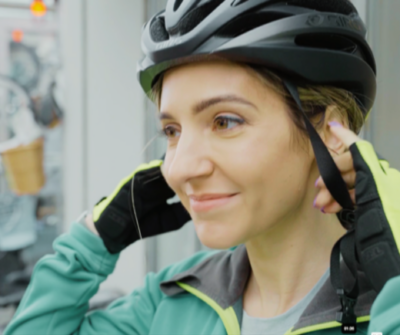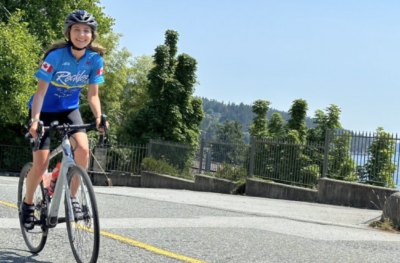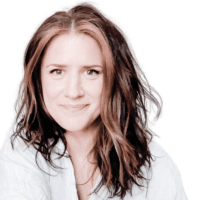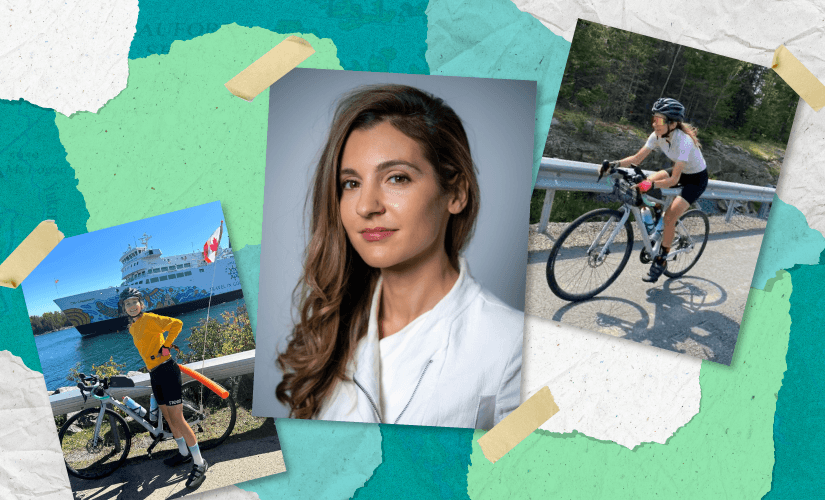Why We Give: Dr. Alex DiGiacomo
September 08, 2023
9 min read
This summer, Dr. Alex DiGiacomo is cycling across Canada in solidarity with kids, teens, and parents who can’t access the psychological care they desperately need.
Perched on the weathered floor of a remote cabin somewhere outside of Kenora, Ontario, Dr. Alex DiGiacomo joins our Zoom call with a burst of warmth and authenticity. She’s undeniably magnetic and speaks with humble confidence as she describes her psychology practice over the past decade.
We caught up with Dr. DiGiacomo during a brief respite from her cross-country trek to learn what fuels her generosity, where she finds inspiration, and how #breakthecycle is a rallying cry that symbolizes the uphill battle faced by families across the country.
How has your work as a clinical psychologist inspired your cause?
My psychology practice revolves around supporting children, teens, and parents struggling with various mental health concerns. We have effective treatments that really work, and I get a front-row seat as kids grow braver and parents stronger. It’s easy to pretend that’s the whole story. But it’s not.

The truth is that accessibility is a huge barrier for the majority of families, and we’re only seeing a fraction of the kids who desperately need help. So many parents are lost. Their kids are not doing well, and they can’t access care.
According to the Canadian Mental Health Association, three out of four kids in Canada can’t access the mental health care and support they need. That’s an average, so we know it’s probably worse for under-serviced communities. That’s a big number.
Access is especially crucial for kids because they’re constantly developing. Delays in treatment aren’t just annoying—they actually interfere with the trajectory of their development and their lives.
I was home in Toronto for the holidays, personally in need of a reset, and spending time with my best friend. Her dad recounted how he cycled across Canada in 1993 as a tribute to his wife after she had passed away. Immediately, I knew that was it. I just thought, what an incredible metaphor and way to support kids and parents who are struggling.
What do you hope to accomplish through #breakthecycle?
When it comes to this problem of accessibility, people get very overwhelmed. It’s a long-standing, systemic issue that feels impossible to solve. But one of the things I believe—and this is backed up by research—is that we don’t have to have all the answers before we start moving in the direction of a solution. I can’t solve this entire problem, but there are three things that I can do:

Raise awareness so people know effective treatments are available, and most kids don’t have access to them.
Raise funds for some of the many incredible charitable organizations in the country that are doing really good work to serve kids.
Share knowledge in the form of what we call psychoeducation. This is so important because we know with emotional and psychological struggles, knowledge actually really matters. Simply having access to education can help.
Do you see your journey serving as a metaphor?
Yes. It’s important to me that #breakthecycle is a metaphor for what families experience. I wanted to do something uncomfortable. Parents and kids feel like they’re facing an insurmountable task, and I wanted to do something in solidarity.
I want to practice what I preach, and as a psychologist specializing in anxiety, I’m always talking about facing fears and tolerating uncertainty. So I’m doing that, and it’s equal parts terrifying and magical. I’ve never been so wonderfully confronted with the fact that there is freedom on the other side of fear.
We may not get to the other side quickly or smoothly, and doing anything in uncertainty is scary, but I believe that bit by bit, day by day, progress can be made. With some support and the right tools, you can be miles from where you started.
Did you or your friends and family have reservations?
Honestly, there was a ton of self-doubt for a month or two. No one thought I could do it. My friends and family definitely weren’t on board, and I know it didn’t make sense on the outside. I don’t have the training, didn’t own a bike, and it’s pretty inconvenient to take two months off work as a psychologist. But this totally lines up with my values, and in the end, the people I love could see that.
I’m forever indebted to a few incredible friends and mentors, including Bob Goff, Maryam Collahi, Jaclyn Bartolomeu, and Jess Janz. Without their support and guidance, I would not have made it to the starting line. They might not know a thing about cycling or endurance events, but they know everything there is to know about courage, dreaming big, and living a value-driven life.
It was actually at Jess Janz’s Dinner with Strangers, sitting around a dinner table with ten strangers, where I found the acknowledgement I needed to make a final leap of faith. The affirmation that not only can I do this, but it completely lines up with my values. I’m taking a bold step in uncertainty, but not a reckless or impulsive one.
Have there been role models in your life who inspired this kind of generosity?
One of my core values is service, and I have seen my parents model that my whole life. They’re constantly giving up their resources and time. I wouldn’t say I was always like that, but as I’ve gotten older, I’ve made a conscious decision that service is an important value of mine.

What we know from psychological research is that the easiest way to live a meaningful life is to live a life that is congruent with the values that you have. And in order to do that, you have to identify those values. My parents are actually my support vehicle. They meet me every 40 kilometres, so I’m not carrying all my stuff.
It’s funny. Initially, they were very concerned when I told them what I was doing! But in the end, when they realized it was happening, whether they liked it or not, they were so supportive.
I think that’s really meaningful. Especially because they didn’t initially approve, and now they’re supporting me day in and day out, which is no easy feat! I give them a lot of credit because I’ve given them lots of grey hairs & they’re still out here cheering me on. Practically speaking, this would be nearly impossible without them.
How do you decide what charities to donate to?
Symbolically, I want kids across the country to be represented. As I ride through each province, I announce the charity for that province, and all money raised will go to charities that are working specifically to fund mental health services & resources for kids, teens, and their families.
I carefully chose charities for the excellent work that they do, and more will be added until there is a representation for every province & territory. Funds raised are held in the Giving Group until the end of the ride, at which point funds get distributed across all of the chosen charities.
Finding a platform that allows one fundraiser to donate to multiple charities was harder than I thought it would be. Charitable Impact was definitely the best option and made this whole process easier and more flexible.
What advice do you have for folks who want to give back but don’t know where to start?
I think in the face of uncertainty, most of us are uncomfortable, and a lot of us have difficulty tolerating it. So uncertainty triggers many unhelpful coping responses, like freezing, procrastinating, avoiding or rationalizing.
What I can deeply attest to, and what we know from decades of research, is that taking one action step in the face of uncertainty has this way of galvanizing hope, having ripple effects down the road, and building momentum. And that’s the kind of thing that leads to a full life.
We’re on a mission to explore why people give. Through candid conversations with donors, we’re unearthing stories that ignite compassion and remind us that a single charitable act can create a ripple effect that travels farther than we could ever imagine.
Behind every act of generosity is a story. If you’d like to share yours or nominate someone whose generosity inspires you, reach out to [email protected]


